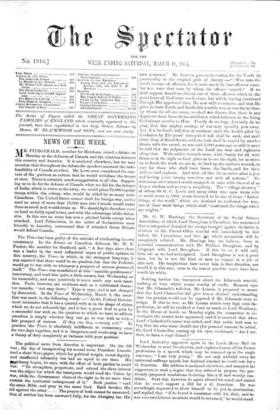The political news from America is important. On the 4th
inst., the day of inaugurating his second term. President Lincoln read a short State paper, which for political weight, moral dignity, and unaffected solemnity has had no equal in our time. His presidency began, he says, with the effort of both partied to avoid war. "To strengthen, perpetuate, and extend the slave interest was the object for which the insurgents would rend the Union by war, while the Government claimed the right to do no more than restrict the territorial enlargement of it." Both parties "read the same Bible and pray to the same God. Each invokes His aid against the other . . . The prayer of both cannot be answered, that of neither has been answered fully, for the Almighty has His
own purposes." Mr. Lincoln goes on to confess for the North its partnership in the original guilt of slavery :—" Woe unto the world because of offences, for it must needs be that offences come, but woe unto that man by whom the offence cometh r If we shall suppose American slavery one of those offences which in the providence of God must needs come, but which, having continued through His appointed time, He now wills to remove, and that He gives to both North and South this terrible war, as was due to those by whom the offence came, we shall Rot discern that there is any departure from those divine attributes which believers in the living God always ascribe to Him. Fondly do we hope, fervently do we pray, that this mighty scourge of war may speedily pass away. Vet, if it be God's will that it continue until the wealth piled by bondsmen by 230 years' unrequited toil shall be sunk, and until every drop of blood drawn with the lash shall be repaid by another drawn with the sword, as was said 3,000 years ago so still it must be said that the judgments of the Lord are true and righteous altogether. With malice towards none, with charity for all, with firmness in the right as God gives us to see the right, let us strive on to finish the work we are in, to bind up the nation's wounds, to care for those who shall have borne the battle, and for their widows and orphans. And with all this let us strive after a just and lasting peace among ourselves and with all nations." No statesman ever uttered words stamped at once with the seal of so deep a wisdom and so true a simplicity. The "village attorney" of whom Sir G. C. Lewis and many other wisa men wrote with so much scorn in 1861, seems destined to be one of those "foolish things of the world " which are destined to confound the wise, one of those weak things which shall "confound the things which are mighty."






























